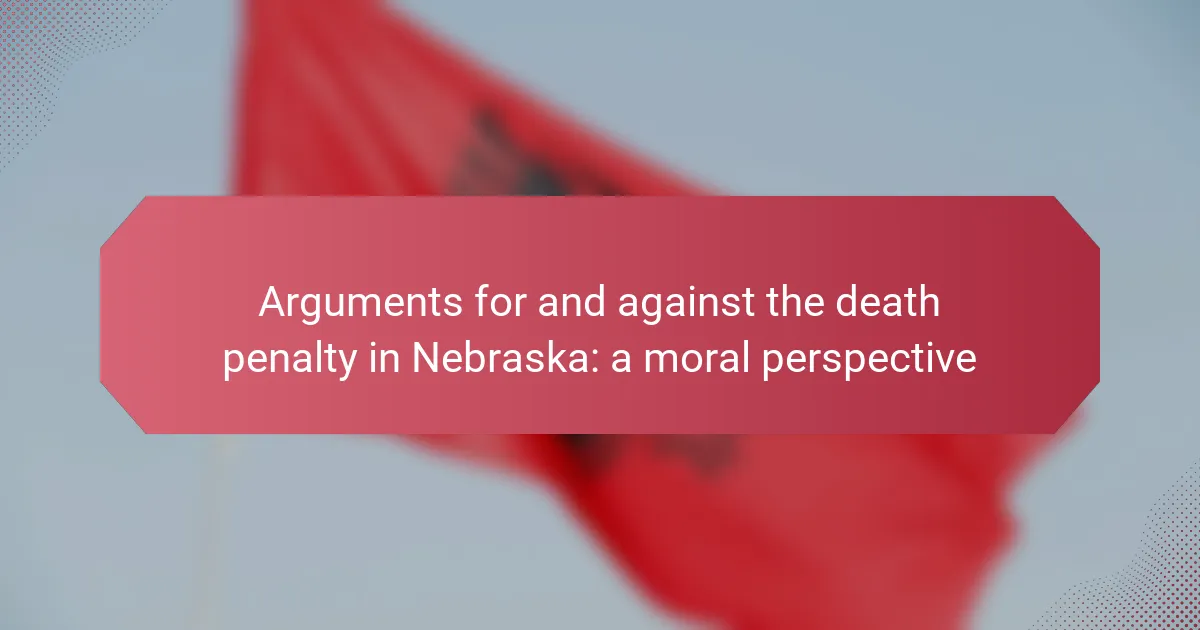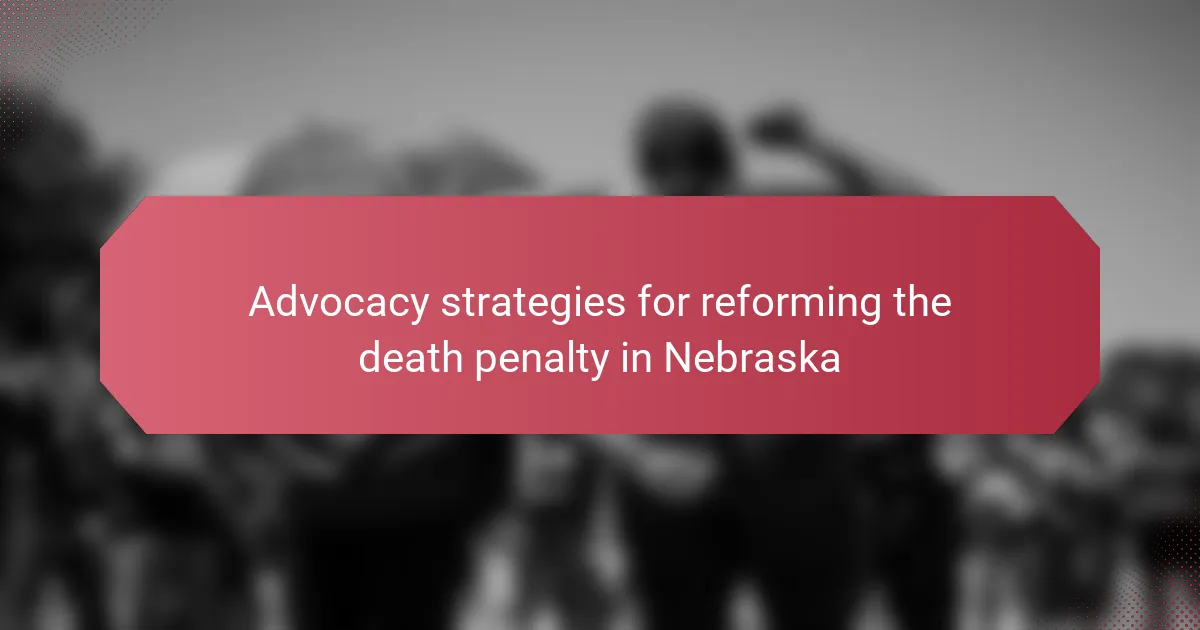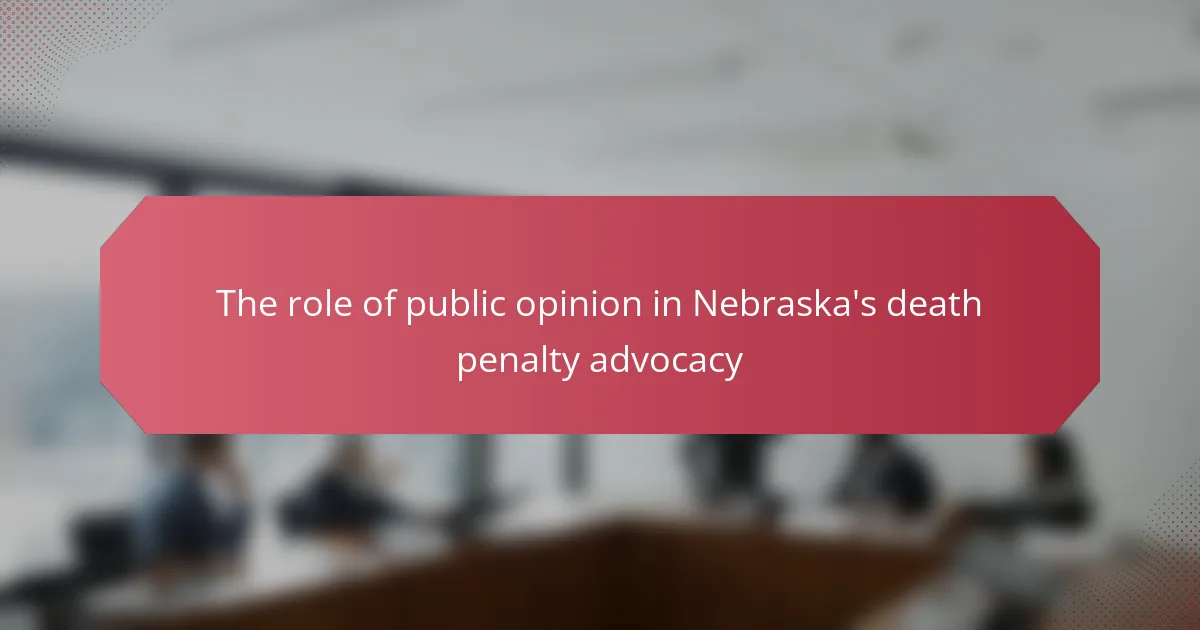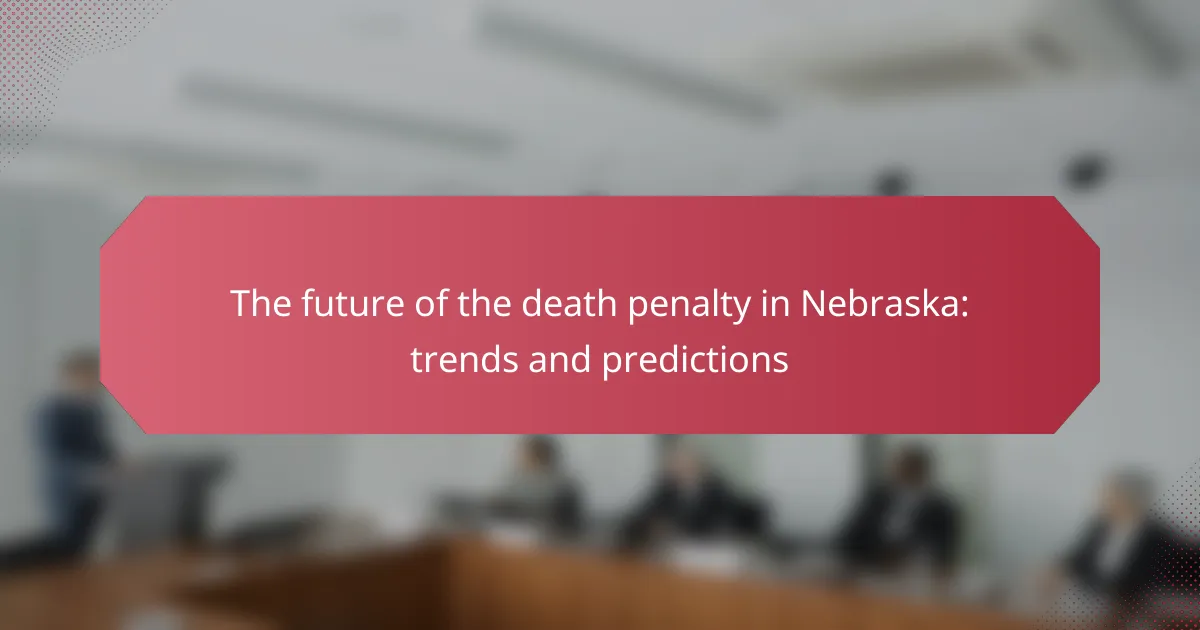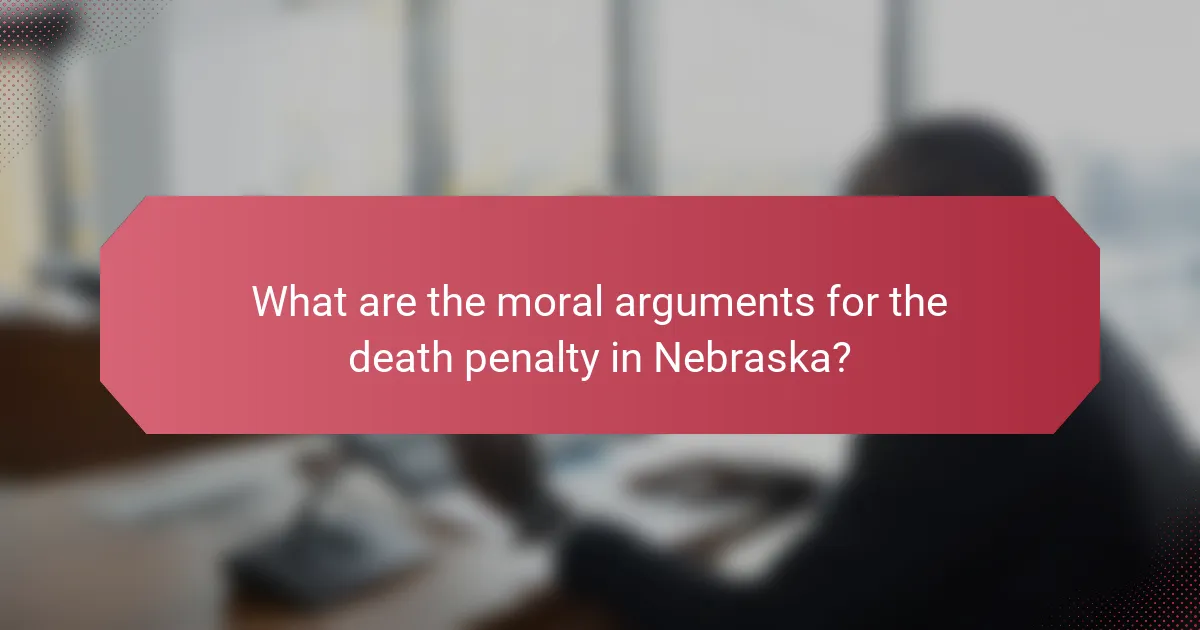
What are the moral arguments for the death penalty in Nebraska?
The moral arguments for the death penalty in Nebraska include retribution, deterrence, and justice for victims. Proponents argue that capital punishment serves as a form of retribution, providing a sense of justice for the victims’ families. They believe that the severity of the crime warrants an equally severe punishment.
Additionally, supporters claim that the death penalty acts as a deterrent to violent crime. They argue that the fear of execution may prevent potential offenders from committing heinous acts. Some studies suggest that states with the death penalty may experience lower murder rates, although this remains a debated point.
Moreover, advocates assert that the death penalty upholds the moral order by affirming the value of human life. They believe that executing those who commit egregious crimes reinforces societal norms and values. This perspective holds that certain actions, such as murder, deserve the ultimate punishment to maintain moral balance within the community.
How do proponents justify the use of the death penalty?
Proponents justify the use of the death penalty by arguing it serves as a deterrent to crime. They believe that the threat of execution can prevent potential offenders from committing serious crimes. Research indicates that states with the death penalty may experience lower homicide rates. Additionally, supporters claim it provides justice for victims and their families. They argue that capital punishment delivers a sense of closure and retribution. Proponents also emphasize that it is a necessary tool for punishing the most heinous crimes. They believe that certain offenses deserve the ultimate punishment to reflect the severity of the crime.
What ethical principles support capital punishment?
Retributive justice supports capital punishment as an ethical principle. This principle asserts that punishment should be proportionate to the crime committed. Advocates argue that the death penalty serves as a just response to heinous crimes, such as murder. It is believed to provide closure to victims’ families. Additionally, some argue that capital punishment deters future crimes. The idea is that the fear of execution may prevent potential offenders from committing violent acts. Furthermore, supporters often cite the moral obligation of the state to uphold justice. They believe that allowing murderers to live undermines the value of innocent life. These ethical principles form the foundation for arguments in favor of capital punishment.
How does the concept of justice relate to the death penalty?
The concept of justice is closely tied to the death penalty as it embodies the state’s response to severe crimes. Justice aims to uphold societal order and provide retribution for heinous acts. Proponents argue that the death penalty serves as a fitting punishment for the most egregious offenses, aligning with the principle of retributive justice. This principle asserts that the severity of punishment should match the gravity of the crime committed.
In Nebraska, supporters of the death penalty often cite the need for justice for victims and their families. They believe that executing a convicted murderer delivers a sense of closure and justice. Conversely, opponents argue that the death penalty can lead to wrongful executions, undermining the justice system. They emphasize that justice should not only be about punishment but also about fairness and the possibility of rehabilitation.
Statistical data shows that wrongful convictions in capital cases have occurred, raising concerns about the reliability of the justice system. The relationship between justice and the death penalty remains a contentious issue, reflecting differing moral perspectives on punishment and societal values.
What are the perceived benefits of the death penalty?
The perceived benefits of the death penalty include deterrence of crime and retribution. Proponents argue that the death penalty serves as a deterrent against serious crimes, particularly murder. Studies suggest that the possibility of execution may discourage individuals from committing capital offenses. Additionally, supporters believe it provides a sense of justice for victims’ families. The death penalty is seen as a way to deliver a proportionate response to heinous acts. It is also claimed to prevent reoffending by permanently removing dangerous criminals from society. Furthermore, some argue that it can lead to closure for the victims’ families, helping them to heal. These perceived benefits contribute to ongoing debates regarding the morality and effectiveness of capital punishment.
How might the death penalty act as a deterrent to crime?
The death penalty may act as a deterrent to crime by instilling fear of execution in potential offenders. This fear can lead individuals to reconsider committing serious crimes, particularly murder. Research indicates that states with the death penalty often report lower murder rates compared to those without it. For example, a study by the National Research Council in 2012 found that the deterrent effect of the death penalty is significant in some contexts. Additionally, the certainty of severe punishment can contribute to a general decline in violent crime. The perception that the death penalty is a possible outcome may lead to a more cautious approach to criminal behavior.
In what ways does the death penalty provide closure to victims’ families?
The death penalty can provide closure to victims’ families by delivering a sense of justice. This sense of justice often helps families feel that the legal system has acknowledged their loss. Additionally, it can reduce feelings of anger and resentment towards the perpetrator. Many families believe that the execution of the offender prevents them from causing further harm.
Research indicates that some families report a feeling of relief after the execution takes place. This relief can stem from the belief that the cycle of violence has ended. Furthermore, closure may arise from public acknowledgment of the crime and its impact on the victims’ lives.
A study by the National Center for Victims of Crime suggests that families often feel validated when the death penalty is applied. The emotional response to the execution can vary, but many report a significant psychological impact.
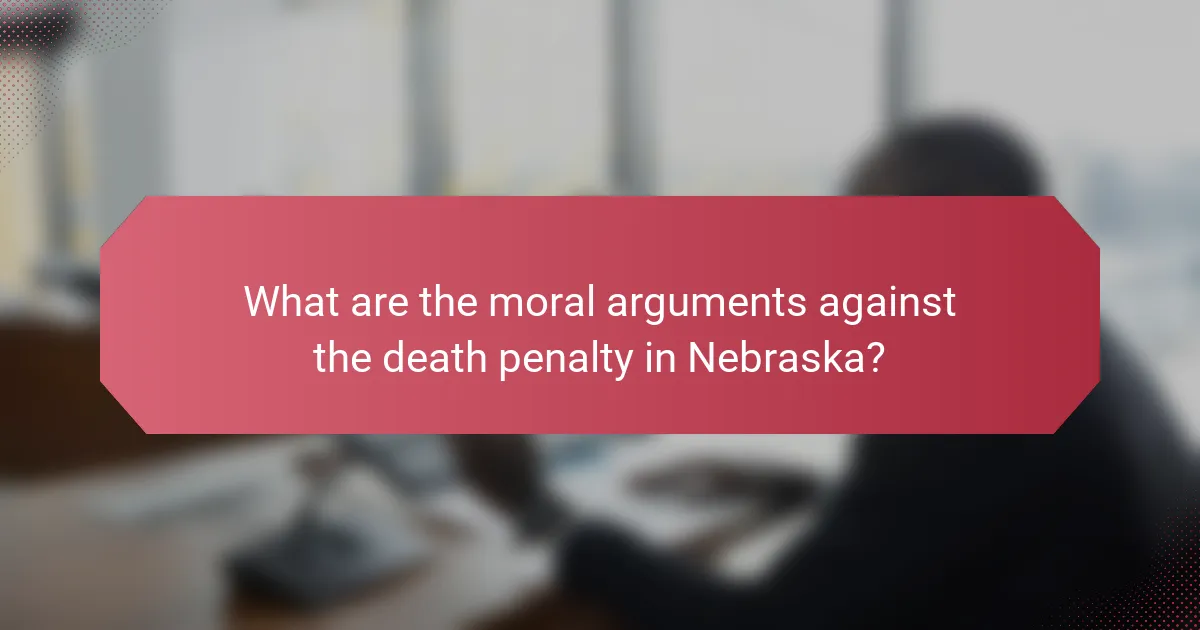
What are the moral arguments against the death penalty in Nebraska?
The moral arguments against the death penalty in Nebraska include the belief in the sanctity of human life. Many argue that taking a life, even of a convicted criminal, is inherently wrong. This perspective is often rooted in religious and ethical principles that advocate for forgiveness and rehabilitation over retribution.
Additionally, there is the concern of wrongful convictions. Studies indicate that innocent people have been sentenced to death, raising ethical questions about the infallibility of the justice system. The risk of executing an innocent person is a significant moral objection.
Another argument focuses on the disproportionate impact on marginalized communities. Evidence shows that the death penalty is often applied more frequently to individuals from lower socioeconomic backgrounds and racial minorities. This raises concerns about fairness and equality in the justice system.
Furthermore, opponents argue that the death penalty does not deter crime. Research has consistently shown that states without the death penalty have similar or lower rates of violent crime compared to those with it. This challenges the moral justification of using such an extreme measure.
Lastly, the emotional toll on those involved in the process, including jurors, witnesses, and executioners, is cited as a moral concern. The psychological impact of participating in executions can lead to long-term trauma, questioning the ethical implications of the death penalty.
How do opponents challenge the morality of capital punishment?
Opponents challenge the morality of capital punishment by arguing it violates the right to life. They assert that taking a life as punishment is inherently immoral. Many believe it is not just to end a life, regardless of the crime. Studies, such as those by the American Civil Liberties Union, indicate that the death penalty is applied disproportionately to marginalized groups. Opponents also argue that it fails as a deterrent to crime. Research shows that states without the death penalty often have lower murder rates. Additionally, the possibility of wrongful convictions raises ethical concerns. Innocent individuals have been executed, highlighting the irreversible nature of capital punishment. These arguments collectively question the ethical foundation of using death as a punishment.
What ethical concerns are raised about the death penalty?
The death penalty raises several ethical concerns. One major concern is the potential for wrongful execution. Studies indicate that innocent individuals have been sentenced to death, highlighting flaws in the justice system. Another ethical issue is the disproportionate impact on marginalized communities. Research shows that racial and socioeconomic factors influence who receives the death penalty. Additionally, there are concerns about the humane nature of executions. Methods used may cause unnecessary suffering, raising questions about human rights. Finally, the death penalty’s deterrent effect is debated. Some studies suggest it does not effectively prevent crime, which challenges its justification.
How does the possibility of wrongful convictions impact the debate?
The possibility of wrongful convictions significantly impacts the debate on the death penalty. Concerns about irreversible errors create moral and ethical dilemmas. Advocates argue that the risk of executing an innocent person is unacceptable. Statistics indicate that wrongful convictions occur in about 1% of death penalty cases. This statistic raises questions about the reliability of the justice system. The Innocence Project has exonerated over 375 individuals, highlighting systemic flaws. These factors contribute to increasing calls for reform or abolition of the death penalty. The debate is shaped by the belief that justice must prioritize accuracy and fairness.
What are the social implications of abolishing the death penalty?
Abolishing the death penalty can lead to significant social implications. It may reduce the perception of the justice system as punitive. Communities may experience a shift towards rehabilitation-focused approaches. Public opinion often becomes more supportive of restorative justice models. The decision can also influence crime rates, though evidence is mixed. In some regions, abolition has led to a decrease in homicide rates. It may foster greater societal discussions on morality and justice. Abolishing the death penalty can also alleviate concerns about wrongful convictions. Studies indicate that errors in capital cases can lead to irreversible consequences.
How might abolition affect crime rates and public safety?
Abolition of the death penalty may lead to varied impacts on crime rates and public safety. Some studies suggest that abolishing capital punishment does not significantly increase crime rates. For example, states without the death penalty, such as Michigan and New York, have had stable or declining crime rates. Additionally, research from the National Academy of Sciences indicates that the death penalty does not deter crime more effectively than life imprisonment. Public safety may improve through a focus on rehabilitation rather than punitive measures. This shift can foster community trust and cooperation with law enforcement. Ultimately, the relationship between abolition and crime rates is complex and influenced by multiple factors.
What alternatives to the death penalty are proposed by opponents?
Opponents of the death penalty propose several alternatives, including life imprisonment without parole. This option ensures that offenders are removed from society permanently. Another alternative is restorative justice, which focuses on rehabilitation and reconciliation between victims and offenders. Additionally, some advocate for enhanced sentencing options that provide a range of penalties based on the severity of the crime. These alternatives aim to address justice without resorting to capital punishment. Studies indicate that life sentences can be more cost-effective than the lengthy appeals associated with death penalty cases. Furthermore, alternatives promote the possibility of exoneration in wrongful conviction cases, which is not possible after execution.
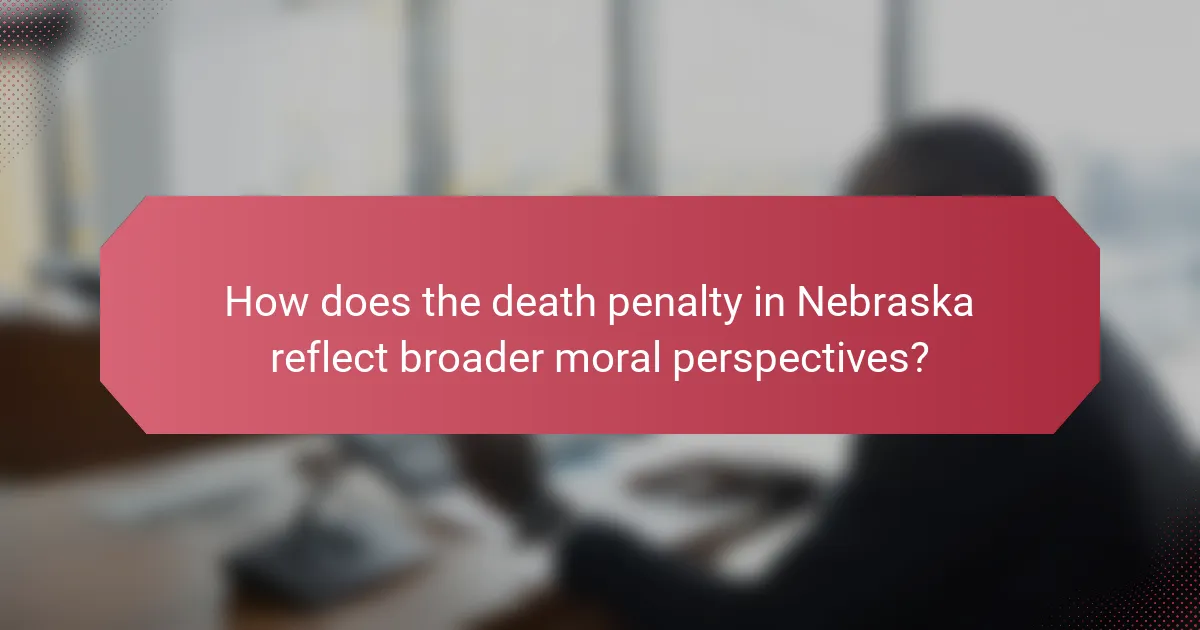
How does the death penalty in Nebraska reflect broader moral perspectives?
The death penalty in Nebraska reflects broader moral perspectives by illustrating the tension between retributive justice and the sanctity of life. Supporters argue it serves as a necessary deterrent to serious crimes, emphasizing justice for victims. They believe that capital punishment upholds societal values by punishing the most heinous offenses. Conversely, opponents highlight moral objections against taking a life, viewing it as an irreversible act that can lead to wrongful executions. They argue that it contradicts principles of rehabilitation and mercy. Nebraska’s legal history, including the 2015 repeal and subsequent reinstatement of the death penalty, showcases shifting societal values and debates over morality. Public opinion polls indicate divided views, reflecting a broader national dialogue on ethics regarding capital punishment.
What role does public opinion play in shaping the death penalty debate?
Public opinion significantly influences the death penalty debate. It shapes legislative actions and judicial decisions regarding capital punishment. When a majority of the public supports the death penalty, lawmakers are more likely to endorse it. Conversely, growing opposition can lead to moratoriums or abolishment efforts. Surveys show that public sentiment varies over time, reflecting societal values and concerns. For instance, a 2021 Gallup poll indicated that support for the death penalty in the U.S. was at 55%, a decline from previous decades. This shift in opinion can prompt discussions about morality and justice in states like Nebraska. As public views evolve, they can impact the legal landscape surrounding capital punishment.
How have recent surveys influenced policy decisions regarding capital punishment?
Recent surveys have significantly influenced policy decisions regarding capital punishment. In many cases, these surveys reveal public opinion trends on the death penalty. For instance, a 2021 survey by the Pew Research Center showed that 60% of Americans support the death penalty. This data prompts lawmakers to consider public sentiment when shaping legislation. Additionally, surveys indicating rising concerns about wrongful convictions have led to calls for moratoriums. In Nebraska, a 2020 survey indicated that 62% of residents favored alternatives to capital punishment. Such findings have directly impacted discussions among state legislators about revising or abolishing the death penalty. Overall, these surveys serve as a crucial tool for policymakers in evaluating the future of capital punishment.
What cultural factors contribute to differing viewpoints on the death penalty?
Cultural factors significantly contribute to differing viewpoints on the death penalty. These factors include religious beliefs, societal values, and historical context. For instance, some religions advocate for forgiveness and rehabilitation, opposing capital punishment. In contrast, other belief systems may support retributive justice, viewing the death penalty as a moral imperative. Societal values also play a crucial role; communities that prioritize individual rights may reject the death penalty due to concerns about wrongful convictions. Conversely, societies that emphasize law and order may favor it as a deterrent to crime. Historical context, including past legal practices and public opinion trends, further shapes these perspectives. For example, regions with a history of high crime rates may be more supportive of capital punishment. Studies indicate that these cultural dimensions directly influence legislative decisions and public sentiment regarding the death penalty.
What lessons can be learned from other states regarding the death penalty?
States that have abolished the death penalty show a trend toward alternatives. For instance, states like Maryland and New Jersey eliminated capital punishment, citing moral and financial reasons. Research indicates that maintaining the death penalty often incurs higher costs due to lengthy legal processes. Additionally, states that have reformed their death penalty laws emphasize the importance of ensuring fair trials and addressing wrongful convictions. For example, Illinois imposed a moratorium on executions after several exonerations revealed flaws in the system. These lessons suggest that states can achieve justice without capital punishment and prioritize rehabilitation over retribution.
How have reforms in other states impacted their death penalty practices?
Reforms in other states have significantly influenced their death penalty practices. For instance, states like California and New Jersey have enacted moratoriums or abolished the death penalty altogether. These changes often stem from concerns about wrongful convictions and racial bias in capital sentencing.
As a result, states that have reformed their death penalty laws have seen a decrease in executions and a shift toward life imprisonment without parole. For example, New Jersey abolished the death penalty in 2007, leading to a complete cessation of capital punishment in that state.
Similarly, California’s recent push for a moratorium reflects a growing trend to reconsider the efficacy and morality of the death penalty. These reforms often inspire discussions and movements in other states, influencing their legislative approaches to capital punishment.
What best practices can Nebraska adopt from these reforms?
Nebraska can adopt best practices from reforms focused on criminal justice and capital punishment. Implementing a thorough review process for death penalty cases ensures fairness and accuracy. Establishing a moratorium on executions allows for evaluation of the system’s effectiveness. Enhancing legal representation for defendants in capital cases can improve outcomes. Promoting transparency in the decision-making process builds public trust. Utilizing alternatives to the death penalty, such as life sentences without parole, can reduce wrongful convictions. These practices have been shown to decrease errors and improve justice outcomes in other states.
The main entity of the article is the death penalty in Nebraska, examined through a moral lens. The article presents a comprehensive analysis of the arguments for and against capital punishment, highlighting key themes such as retribution, deterrence, justice for victims, and ethical concerns regarding wrongful convictions and societal impact. It explores the justifications provided by proponents, including the belief in proportional punishment and the death penalty’s role in upholding moral order, while also addressing the objections raised by opponents, such as the sanctity of life and the risk of executing the innocent. Additionally, the article discusses the influence of public opinion and cultural factors on the death penalty debate in Nebraska.
